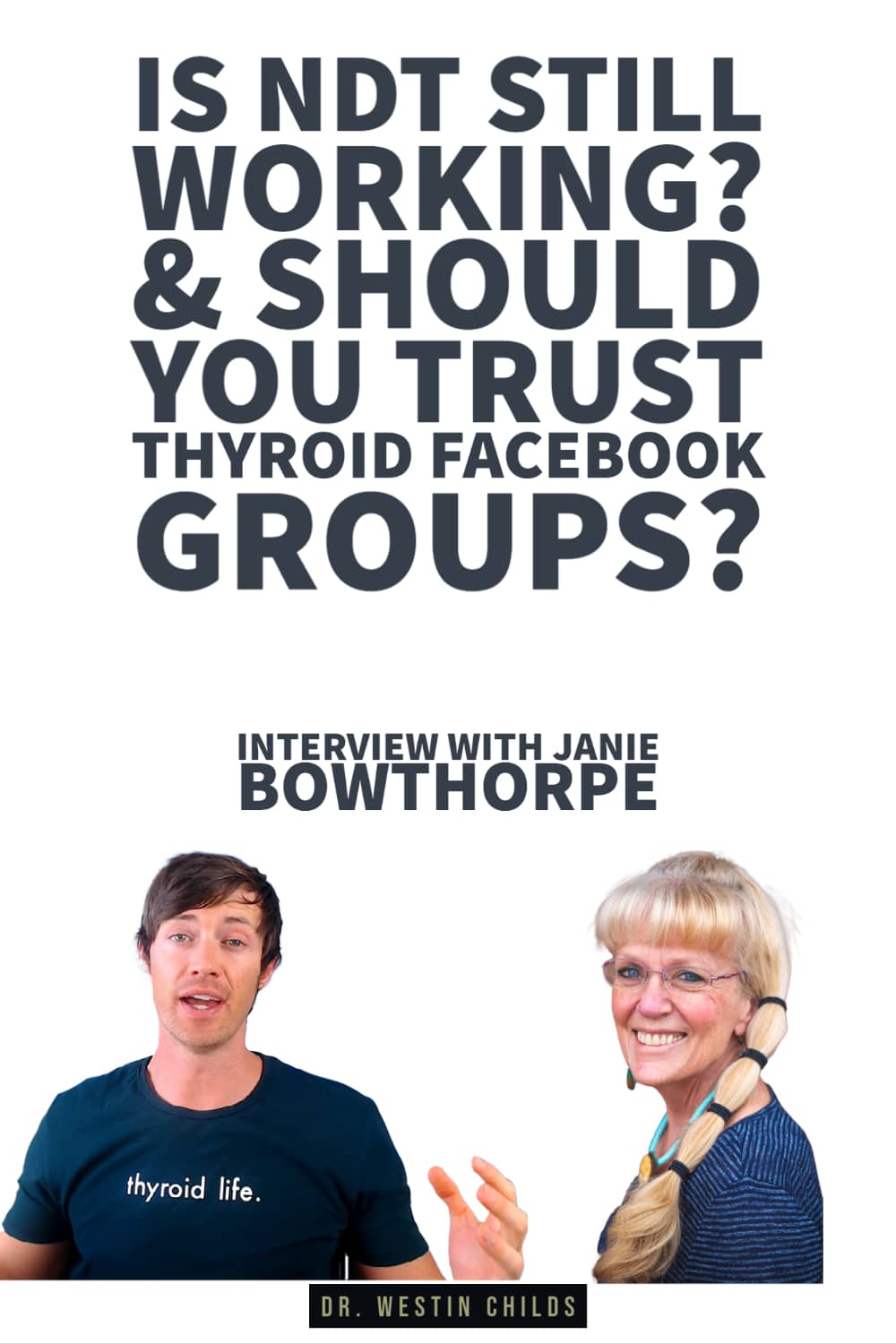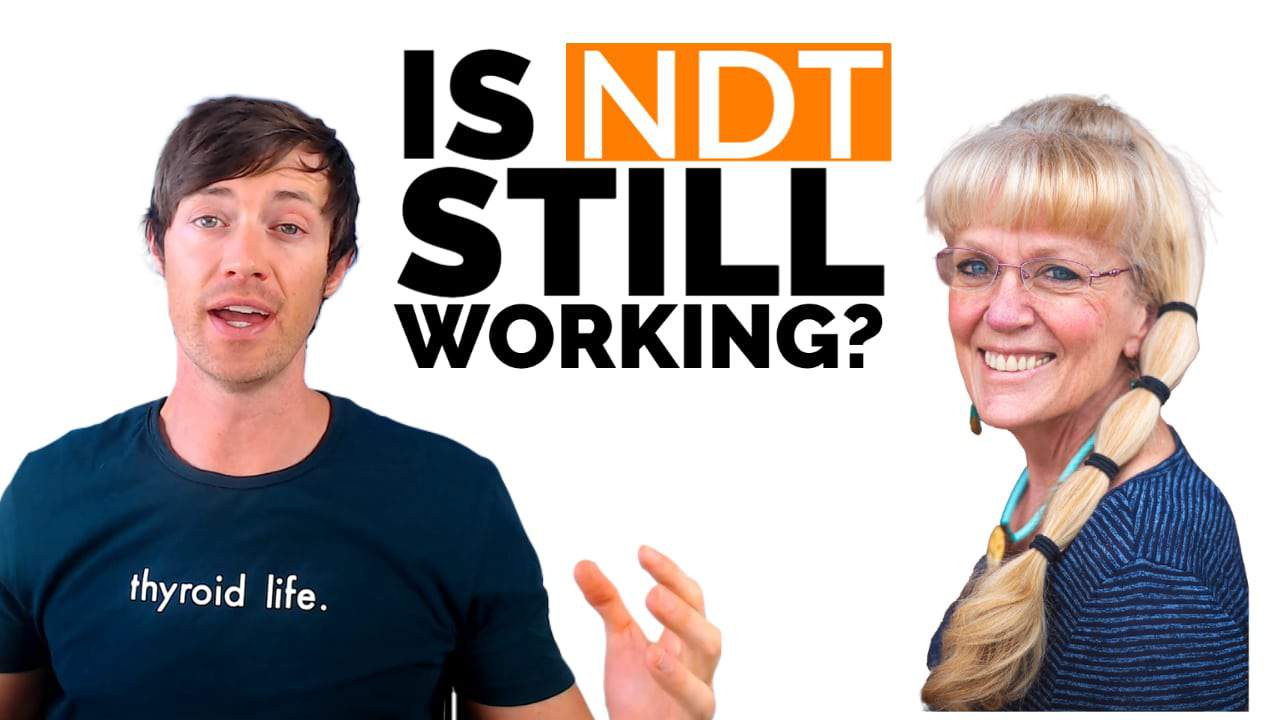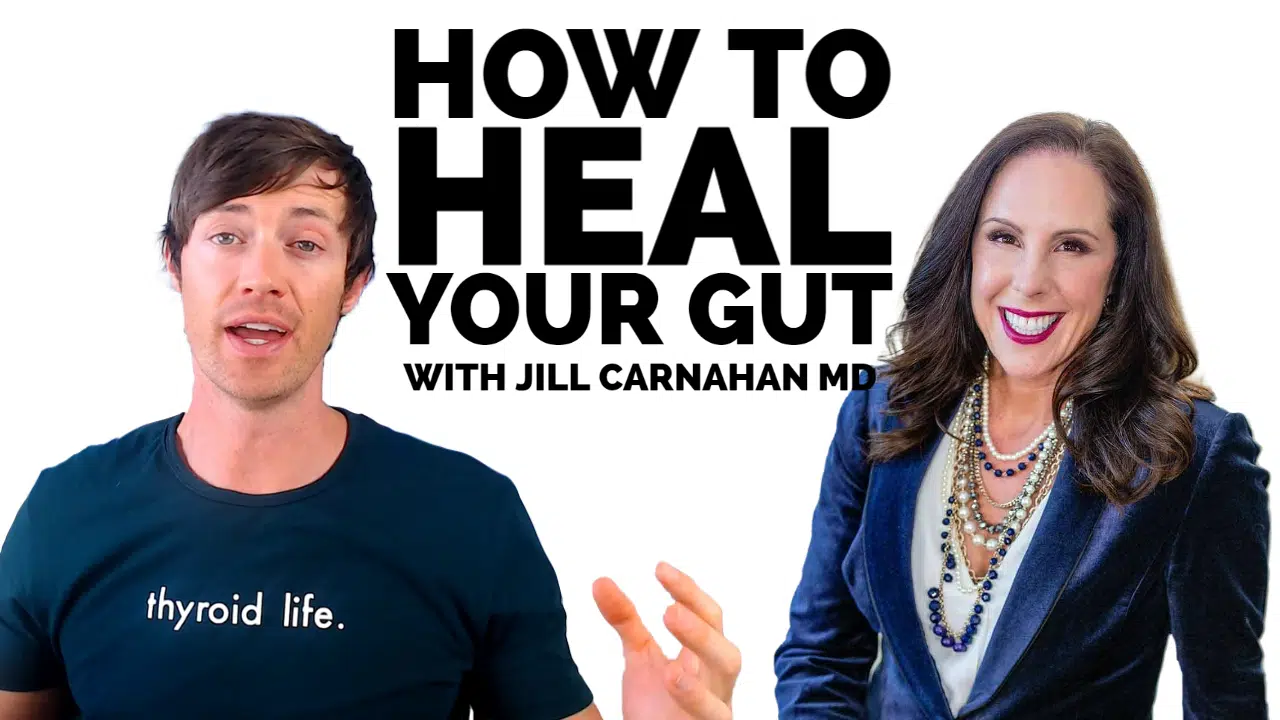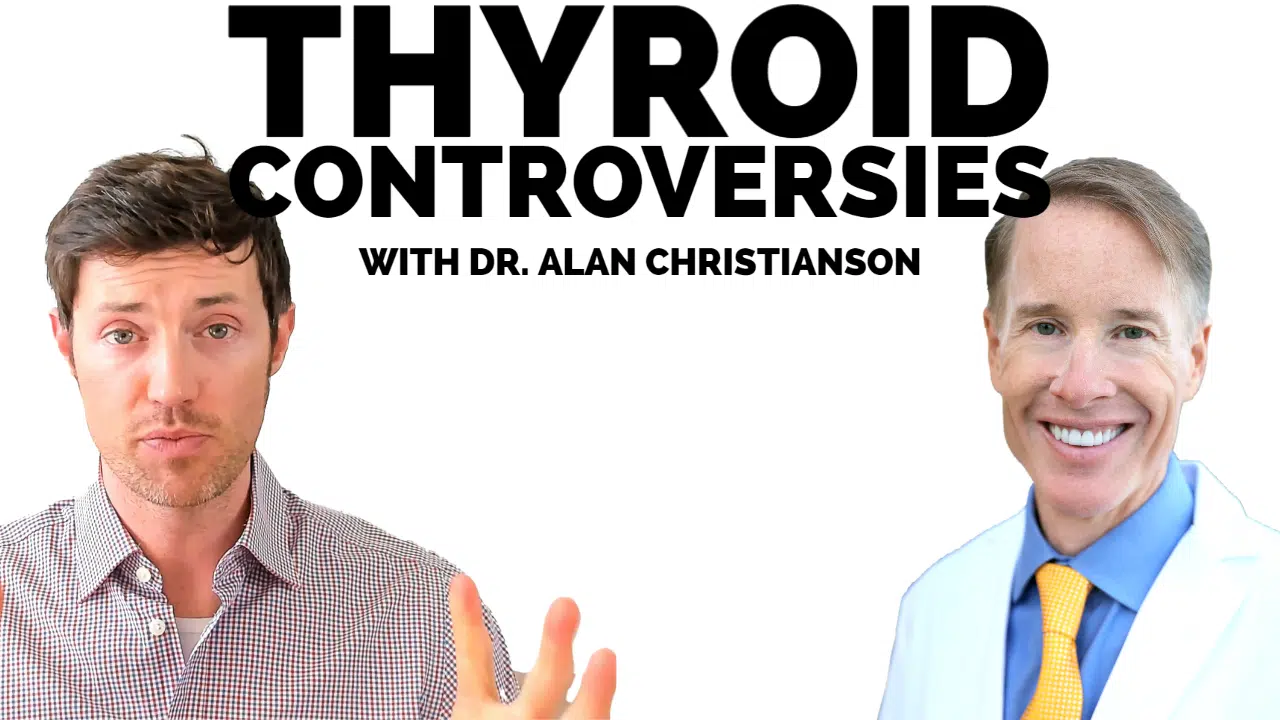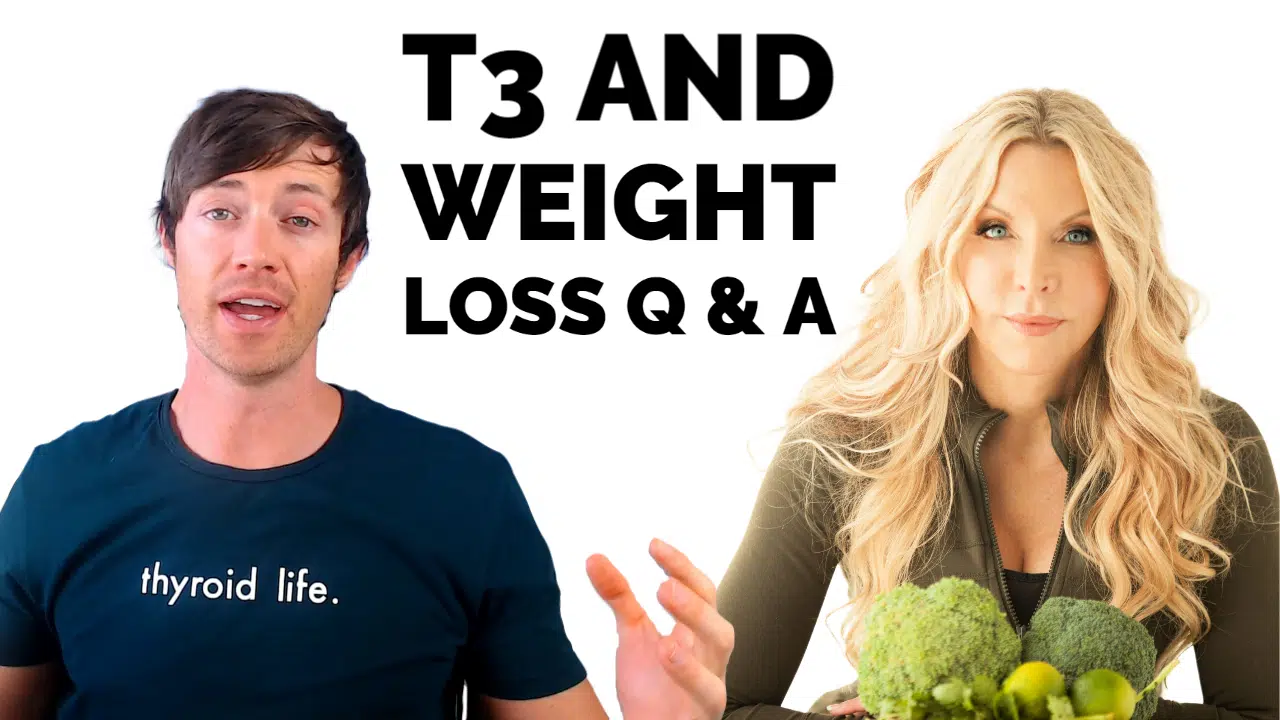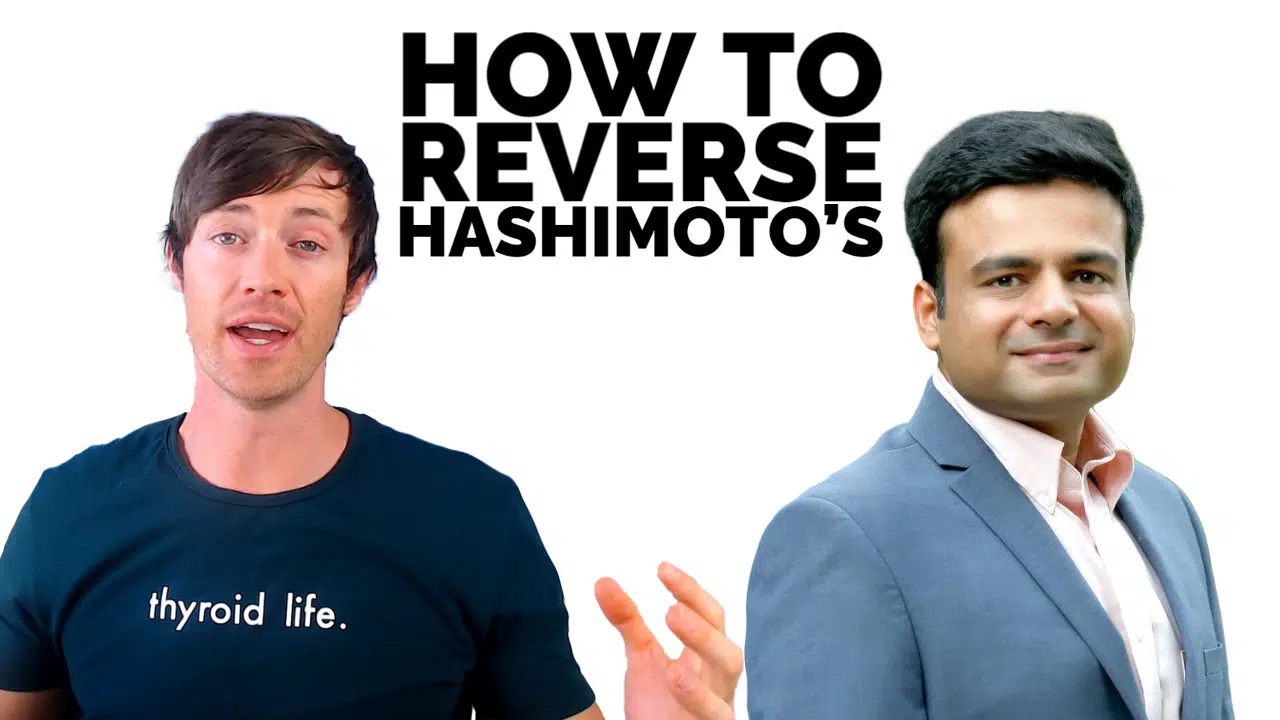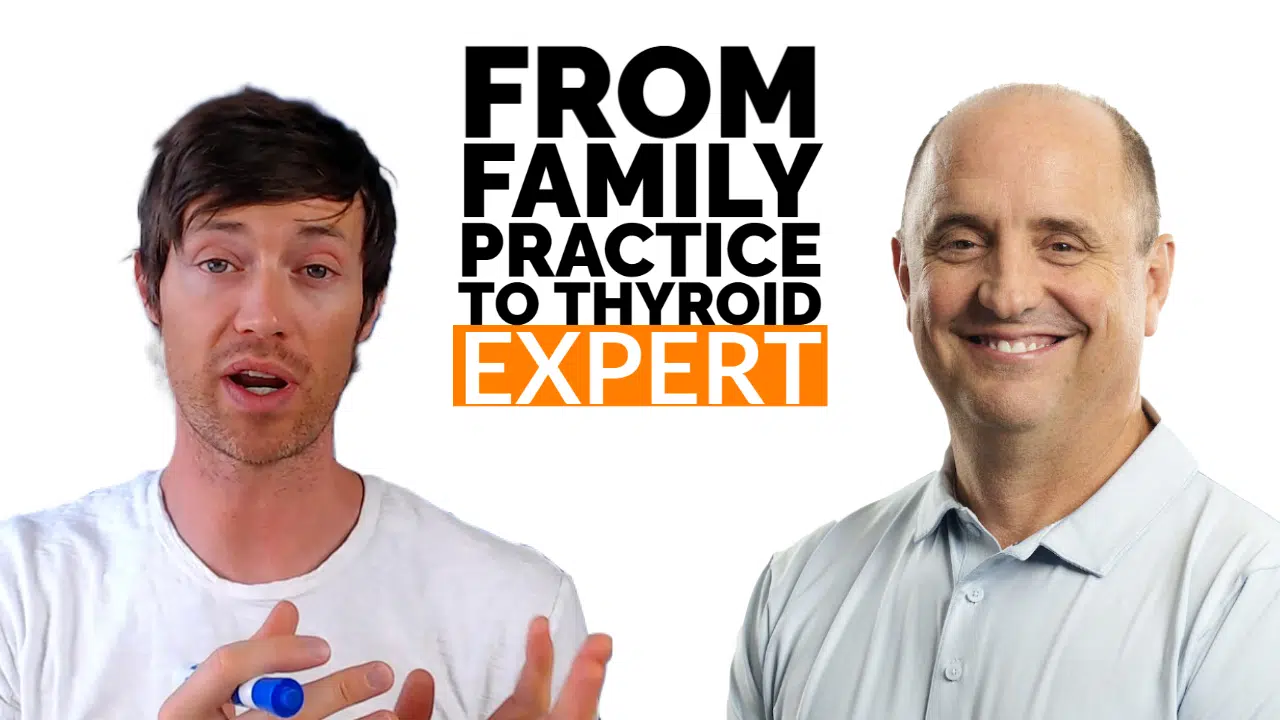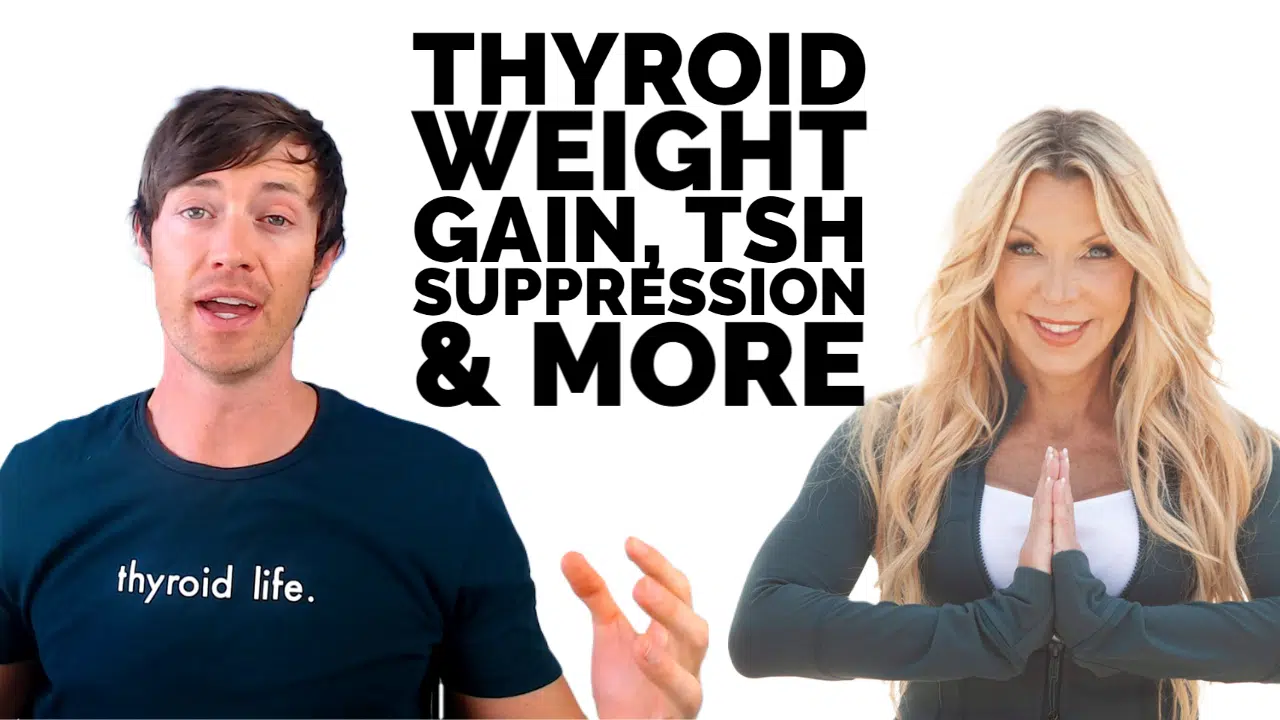Interview with Janie Bowthorpe, 20 Year Thyroid Patient Advocate
Show notes & links from the video
In this video, I interview Janie Bowthorpe. Janie Bowthorpe is an author and thyroid advocate. She is the Author of the Stop the Thyroid Madness books as well as the creator of the Stop the Thyroid Madness Website where she has spent many years writing about her experience and the experience of other thyroid patients. With the use of NDT, she was able to reclaim her life and she now helps other thyroid patients do the same.
We spend a lot of time time talking about Natural Desiccated Thyroid and what makes it a great thyroid medication. Janie goes into detail on how she was able to improve her health with the use of NDT, how much NDT she is taking, and how her dosing has changed over the years.
We also spend time talking about the pitfalls of using thyroid facebook groups. These groups have some benefits but they can also the source of a lot of bad information which then gets propagated in the thyroid community
If you want to learn more about Janie you can check out her website as well as her books below:
- Stop the Thyroid Madness Website
- Stop the Thyroid Madness Book
- Problems with NDT
- Thyroid medications that are still working in 2021 – A list of thyroid medications that still work and can be used for thyroid patients (updated).
- Recall of NP thyroid, WP thyroid, and Nature-throid – Several brands of NDT have been recalled over the last few years, you can read more about these recalls here.
- Shortage of Nature-throid – Nature-throid and WP thyroid are currently not being manufactured so Armour thyroid may be the go-to NDT formulation right now.
- More information on Armour thyroid – Problems and things to know about Armour thyroid before you use it.
- More information on iron and thyroid function – More information on the connection between low thyroid function and iron deficiency.
- Nutrients deficiencies which impair thyroid function – List of nutrient deficiencies that should be looked at and addressed in all thyroid patients.
Audio Transcript
Dr. Childs:Hey guys, it’s Dr. Childs here. Today we have a special guest and that is Janie Bowthorpe. Janie Bowthorpe is an author and thyroid advocate. She is the author of the Stop the Thyroid Madness book series, as well as the creator of the Stop the Thyroid Madness website, where she has spent many years writing about her experience and the experience of other thyroid patients. With the use of NDT, which we’ll be talking a lot about today, she’s been able to reclaim her life, and she now helps other thyroid patients do the same. She’s been a huge help to the thyroid community over the last 20 years, and I’m really grateful to have her on the show. Janie, welcome.Janie B.:Thank you, Dr. Childs. I’m very glad to be here.Dr. Childs:I’m really glad that you’re here as well. I think we’re going to have a really good discussion here. I think it’s going to be really helpful for thyroid patients. What I want to do is, I’d like to just hear a little bit about your backstory. How you got into thyroid management and thyroid advocacy. Can you just tell us what’s gone on with you and your thyroid story, if you don’t mind?Janie B.:Well, very quickly. In my late twenties, I started having symptoms of Hypothyroidism, and like millions probably since 1960, I was put on T4 only. Started out to be Synthroid and about 10 years later, it moved to Levoxyl, and I never got well. It was very frustrating. Because I never got well and because every single doctor that I went to, because I was getting worse, said, “Oh, Janie, it’s not your thyroid. You’re adequately treated. Your TSH is normal.” I was left sick.Janie B.:Finally, I was getting ready to apply for social security disability. I couldn’t even leave the house anymore. It was that bad. Before I finished the application, I decided on my own, because I have the personality to do that, to do one last-ditch effort to find out because I learned to believe it has to be the treatment they put me on. There’s nothing else wrong with me. I found out about Desiccated Thyroid, and we’re going to talk about that because there’s more than just Desiccated Thyroid.Janie B.:Got on it with one nurse practitioner. Had to get a second one to let me raise it and I raised it on my own and happened to get optimal, didn’t know it. Changed my life. At that point, I was angry and disappointed that I went that long, and I thought we got to talk as patients, so that’s how I started the movement.Dr. Childs:Okay. I see. And so it was because of your journey and your experience and you going from basically almost getting on disability to then… Would you say you reclaimed your life back a hundred percent? Did you go from back to where you were previously?Janie B.:Yeah, literally. A hundred percent.Dr. Childs:That’s amazing. In fact, I really want to focus on that just for a second, because I think that there’s this idea among thyroid patients where they just feel like they’re going to have to live with whatever their symptoms are. Even some of them will let’s say maybe feel a little bit better with Levothyroxine or even NDT, I’m sure we’ll be talking about this later, but there are some people who are using perhaps the right medication, but at the wrong dose, and so they’re getting on their way there, but maybe they’re 70% of normal or 80% of normal.Dr. Childs:I really like your story because you’re showing that you can get back to a hundred percent on thyroid medication. You can live that normal life. What I do want to ask you is, Janie, how long did it take you from starting the Natural Desiccated Thyroid, and we’ll talk about which one you were taking in just a second here, but how long did it take you from starting it to figuring out how much you needed? How long of a process was this for you?Janie B.:Actually, it was just several weeks.Dr. Childs:Oh, you did it quickly.Janie B.:I was doing it on my own because the doctors knew nothing. I just had to find some that would let me get… Now at the time, it was Armour, which is kind of ironic with what’s going on now, and it worked beautifully then. They didn’t know what they were doing. I just found two nurse practitioners that were willing to let me do it. I would say several weeks, not just a few, but several weeks, and I was shocked.Dr. Childs:Yeah. That’s amazing. I would say when you were dosing your medication, your Armour back then, were you doing it just based off how you were feeling? How were you self-dosing at that time? Do you remember?Janie B.:Back then, I and we, did not know what we know now. All I could do was just… Somehow I knew to keep raising, and I don’t really know how I knew that, but I just kept raising. Back then, my dose was three and three-fourths grains. I think that’s what it was then. I don’t know how I knew. I just intuitively knew I needed to get up there, and I stayed there for years.Dr. Childs:Okay, good. Actually, let me ask you this while we’re on this topic. Over the last, let’s say, because this was probably what 20 years ago, is that about right?Janie B.:Mm-hmm (affirmative).Dr. Childs:Since that time, and now, how has your dose fluctuated over that time period?Janie B.:Not much. There was a period that I started going into perimenopause and that’s where my progesterone had fallen, and my estrogen was high, and that extra estrogen was binding some of the thyroid hormones I was on, so I had to move to four grains. Then, once I entered menopause, I went down to three and a half, and I’ve been at three and a half for a few years now.Dr. Childs:Okay. Are you talking about the increase in sex hormone-binding globulin as a result of estrogen therapy? Is that what you’re referring to?Janie B.:Yeah, when my estrogen was high, we know that it binds some of the thyroid hormones, it’s not a hundred percent. I was feeling it. I was feeling more hypo, so I went to four grains. Did fine. Went through menopause, and then I realized four grains was too much. It was making my Free T4 too high, and it was starting to convert to rT3, which I can explain. So I went down to three and a half and that was my optimal dose and has been for several years.Dr. Childs:That’s really good to know. I do actually want you to expand on that because I think… There are two ways that you can think about this. First of all, you have this group of patients out there who I think are being treated mostly based on whatever the doctor says. Their doses are being adjusted solely based on the TSH.Dr. Childs:Then you have, I think perhaps, and I’m kind of maybe putting words into your mouth here, but you have a group of thyroid patients who are more knowledgeable, who probably know even more than many doctors do and you guys are dosing based off of… Is it another way that you’re finding your target dose there? How would you say you’re getting to that target dose? Is it based off solely symptoms? Are you looking at lab tests and a combination, how does that look for you?Janie B.:It actually isn’t based on symptoms to the degree that you think it is. We had to learn all of this the hard way and the group I started, I said, “Let’s talk.” I was not going to go by anybody’s opinion. I knew that. Thank goodness I knew that. Kept my ego under control. Went by what is your experience, and what is your experience?Janie B.:In the early years, we discovered a lot because some people were willing to experiment back then and the experimentation also gave us knowledge besides all of us and there were some things we were reading. Over the first several years, we found out that you have to get the Free T3 especially, and the Free T4, if you have a combined treatment, in the right area of the range. We saw that if we do not get those in the right area of the range if you have a combined treatment, you will eventually crash.Janie B.:In other words, if you get, for example, your Free T3 mid-range, or slightly below or slightly above, you do feel better. See, that’s why you can’t solely go by symptoms we learn repeatedly and worldwide because you will feel good at first but what happens is the way we word it, because we’re not doctors, we’re patients, we say the amount that puts you anywhere around mid-range is not enough, and this is the way I say it, for your weekly, monthly, and yearly needs. The individuality of when you’re going to crash.Dr. Childs:Well, would it be fair to say then that you are looking at the whole picture, but maybe you’re putting different weights on certain values? Let’s say Free T3 is that… Have more weight than let’s say TSH or Free T4. Is that how you’re thinking about it?Janie B.:Oh, yeah. People are listening. T3 is active thyroid hormone. It does have a lot of weight, but when we’re on combined, we’re also looking at the Free T4, but we pay attention to the Free T3. Our goal, we learn, so we don’t crash, is to get it in the upper area. Now notice, I just said upper area. There are very few absolutes in thyroid treatments and people try to make absolutes and that’s not patient experiences. So the upper area, it will also happen with Desiccated Thyroid to put it around mid-range or slightly higher.Dr. Childs:Then, as you’re doing this, I assume you’re probably also paying attention to symptoms and seeing how people feel. Are you watching anything, like let’s say, basal body temperature or resting heart rate. What does that look like for you?Janie B.:We used to think that was important, but what turned out to be more important is we found out that you have to have, when you’re raising without having problems, you have to have the right amount of iron, and we learned what that is, which you can see on the lab values page on the website.Dr. Childs:Okay. We’ll send people there.Janie B.:Yeah. You have to have the right amount of iron because if you don’t, and you’re raising something with T4 in it, the T4 starts converting to rT3. Number two, you can’t have high inflation as your… Inflammation. InflationDr. Childs:You don’t want inflation either.Janie B.:You can’t have high inflammation when you’re raising. That will raise rT3, and you can’t have a cortisol problem because cortisol problems, we used to think it was only low, but it’s also high that as you’re raising, and we named it pooling, and it fits, that as you’re raising the Free T3 starts going high in the blood and not making it to the cells. So you got to have the right…Janie B.:I’m trying to send my husband to the door. Well, maybe that’s just a delivery man.Janie B.:You have to have the right amount of cortisol when you’re raising. Those are important.Dr. Childs:Okay, good. When you were mentioning crashing, are you talking about the thing that happens and, correct me if I’m wrong here, but I see this a lot where you’ll have people who will get started on thyroid medication like Levothyroxine or even NDT, they’ll feel better for a period of time then they might get worse, and they feel better if they up their dose, and then they feel worse. Is that what you’re referring to when you say crashing?Janie B.:Oh yeah, because again, when people hit mid-range, they do feel better. We used to go by that, but then a lot of us were crashing. The individualities when we crashed went, “Oh, we may feel better at mid-range,” but as I say, it turns out that is not enough for our weekly, monthly, and yearly needs. The individuality is when we crashed, meaning Hypothyroidism comes back.Dr. Childs:Gotcha. Do you see any sort of, let’s say, problems with this approach? Do you see people who are maybe accidentally overdosing or… My only concern here would be, and I’m a big fan of people doing things on their own. I think it’s actually really important, especially in this space, but I do worry that maybe some people might take too much accidentally, or is that just not something you see? What’s your opinion on that?Janie B.:Well, you have to understand my approach. My approach is to educate. In fact, I have an M.Ed, Master’s of Education, so it’s natural for me to educate. What I’m always doing is educating through the website and the books and the blog and coaching calls. Here’s what patients have learned. I can’t change if somebody doesn’t listen and there are people that are not reading, they’re not listening, but all I can do is keep saying, you’ve got to keep looking at your Free T3 and Free T4. I want to add here, you got to look at that rT3, then you won’t overdose, and you’ve got to learn where you’re supposed to fall.Dr. Childs:Sure. Will you also just elaborate just real quickly here for anybody who maybe doesn’t know what the rT3 is? Will you just explain a little bit of the physiology there, what Reverse T3 is, and what you’re looking for? Do you want it high? Do you want it low? I know this, but just, if you could explain it for these people listening.Janie B.:Oh, I have a lot to say to you.Dr. Childs:Okay. Let’s hear it.Janie B.:Remember that I’m about 20 years of patient-reported observations and experience. Also, I look for consistency. Just because one or two people tell me this, I don’t report it. I wait until I see consistency among a large body of patients.Janie B.:rT3, Reverse T3, is an inactive hormone. I have to talk to all levels, so I explain as easy as I can. Everybody can make rT3. If you’re in a car accident, and you’re injured, your rT3’s going to go up, and there’s a reason. If you have a virus, and we’re suspicious of COVID, your rT3’s going to go up. That means the body slows you down, so it can concentrate on healing you. Well, for us, the rT3 will go up for three reasons and I said them earlier, low iron, inflammation, high cortisol. So you got to also keep track of that because if your rT3 is going up, whoops, you’ve got something you need to correct.Dr. Childs:Okay, good. Then, when you’re looking at Reverse T3, are you looking for specific ranges? You said there’s an optimal range for Free T3. What are you thinking about in terms of Reverse T3 ranges? Any insight there?Janie B.:Oh, yeah. Let me tell you this. All these years, we’ve also been looking at labs and lots of labs in the groups that I was a creator and was a part of and there were occasional individuals that help out. We began to see with all lab work, it has nothing to do with falling anywhere in those ridiculous ranges. You’re still sick if you’re falling anywhere. What we saw is that healthy people fell in a certain part of the range.Janie B.:Now, there’s little gray areas. There’s nothing absolute, but we saw that people without an rT3 problem who were coming in our group were generally the bottom two numbers of U.S. and Canadian top ranges and some European, the bottom two numbers or below and some of them were third from the bottom, but they weren’t higher. So that is our goal. Now it’s going to be a little different with some worldwide ranges that are broader, but if you compare your range to U.S. ranges, Canadian ranges, you’ll see where those bottom two numbers, sometimes a third from the bottom, fall and figure out what that means with your broader range.Dr. Childs:So you looking at optimizing for Free T3 within the higher end and Reverse T3 at the lower end, is that a generalization that we can make based on your experience?Janie B.:Yeah.Dr. Childs:That’s exactly what I tend to think. I do think people like to look at numbers. Everybody likes to have specific numbers. It needs to be this value. I’ve gone as far as to say, there are ranges, let’s say percentage ranges, but I don’t even think that’s really great either because of the reasons you mentioned previously, but I will say, I think that is better than nothing. I do think it’s a step in the right direction.Dr. Childs:What I mean by that is if you look at the TSH range, which is like 0.5 to 4.5, let’s just say, or 5.5, depends on which one you’re looking at, and you look at that broad range, and you’re saying, “Well, try and get your TSH between one and two.” That’s better than the previous one, but it isn’t completely there. Do you get what I’m saying? You’re stepping in the right direction, but you’re not all the way there.Janie B.:No, and it’s not because we as patients know where patients fall, generally, there are gray areas where they don’t have Hypothyroidism, and the majority, no absolutes, are generally in the ones. Every once in a while we’ll see low twos because we know the TSH varies. They’re not even three.Dr. Childs:I agree with that completely. Above two, I think you start to get into problems. If you’re someone listening to this, and you have a TSH of 2.2, 2.3, 2.4, something like that, and you’re taking thyroid medication, chances are, you’re probably going to need more than that. That’s just been my experience.Dr. Childs:Let’s do this. Let’s shift into talking a little bit about NDT. I know you’ve been a big advocate of using Natural Desiccated Thyroid. Can I have you just briefly explain what NDT is, and then I want to talk, transition into a little bit of the problems that have been happening with NDT, and where that puts thyroid patients at, is this still an ideal thyroid medication for people to use? Should they be transitioning to combo T4/T3 medications? Let’s start the conversation with NDT there, if you don’t mind.Janie B.:Okay. I have a lot to say.Dr. Childs:Okay. All right. Let’s hear it.Janie B.:Desiccated Thyroid, which is usually porcine, versions of it, sometimes they were sheep, I’ve got a bottle of sheep, started being used in the 1890s, and it worked and hyperthyroid patients were on animal thyroid for decades, and it worked.Janie B.:Then what happened? I’ve done a lot of research, that around 1960, Knoll Pharmaceuticals, which then made Synthroid, decided to market Synthroid, calling it a new and modern way to treat Hypothyroidism. Unfortunately, the doctors fell for it. There’s one that didn’t, and he’s in Canada. I forgot his name. It’s a D-word, but they all fell for it, and they started changing their hypothyroid patients from what worked, which was porcine thyroid, to Synthroid, which is T4 only. There is one doctor, that Canadian doctor, that admitted to me, he was seeing his patients go downhill in the 1960s, including my own mother. That was a tragedy.Janie B.:Most of us, not all, have been put on T4 only, which is just a storage hormone meant to convert to T3, but we found there are too many problems for a lot of us sooner or later that are going to block the conversion of T4 as a storage hormone, to the active T3. I come along and my life changes on Desiccated Thyroid. There were others that were starting to see that maybe a year or two before I came along, but it wasn’t well known. Changed my life. The reason I started promoting Desiccated Thyroid, it made sense. It was natural. It had T4, T3, T2, T1, and Calcitonin. It’s still around today, but we need to talk about that. It was working for everybody. That doesn’t mean that you couldn’t get on other versions, but it was just big. It was really cool. People wanted natural. It really worked if you knew to get optimal.Janie B.:Now, fast-forward. Dang, there’s been a tragedy. I understand that there was a facility, I think it was in Arkansas at the time, it’s not anymore, called American Labs. As I understand it, they were the distributor of porcine powder. I’m not privy to why, because of all the secrets going on, but around 2017, they stopped supplying porcine. I wish somebody who had knowledge would tell me why. We heard rumors, but I won’t go into that. When they stopped supplying porcine powder, several of the pharmaceuticals moved to other sources. Two of them admitted that they were getting it from Europe. Well, what does Europe mean? All right. The Canadian version was admitting it, and Acella was admitting it.Janie B.:Along with that change, problems were coming up. The first problem was Nature Throid. Nature Throid and WP Thyroid had been around, wonderful products, since the 1930s. People were starting to grow in the amount… They’re saying my symptoms were coming back on Nature Throid and finally on WP. That went on for two yearsDr. Childs:What timeframe were we, by the way, when this first started, just so we have an idea?Janie B.:It was by 2018 that I was seeing an increase in patients reporting it was problematic.Dr. Childs:I was thinking around 2016, ’17 so that probably makes sense. It was probably building up.Janie B.:Yeah. Maybe it started in ’16, 2020 with COVID has messed up my dates. But anyway, there was a two-year period that a lot of people were going downhill. It was obvious. Then it was recalled. To us, that was the right thing to do because we were all going downhill. So Nature Throid had gone downhill for us. WP Thyroid had gone downhill for us. They’re both made by RLC.Janie B.:Then it started happening. I think the next thing was in 2019, there was another Desiccated Thyroid product that used to be wonderful, and it may be back, but anyway, it was called NP Thyroid and that’s by Acella. Great product. It was like the old Armour and wonderful product. Now, Armour’s been around all this time. It went downhill, and it went downhill in a weird way. Patients were reporting weird symptoms, burning down their throat, burning in their stomach.Dr. Childs:Yeah, the change of the smell I believe too, right?Janie B.:The smell was like, we’d just say it, cat piss.Dr. Childs:Ammonia is what it is, but yeah.Janie B.:It smelled like cat piss.Dr. Childs:That’s what I heard, yeah.Janie B.:Then it was recalled, and we all believed, thank God because it was harming people. There were others along the way that went out of business. We think the FDA had something to do with it. Generics. I’ve got them on a timeline on the website. The only one left has been Armour. It was still working.Janie B.:The makers of Armour, which has changed hands with pharmaceuticals, were saying, we are getting our porcine. They were initially saying from Canada and the U.S. There’s another one now. Okay. Fast-forward. Whoops. We have some suspicion, but it’s not all, there are no absolutes here, that some people were having problems that didn’t make sense who had been successful for years.Dr. Childs:On Armour Thyroid?Janie B.:Yeah, on the only one left that was working.Dr. Childs:And we’re talking about today. We’re talking recently.Janie B.:Yeah.Dr. Childs:Okay. I just wanted to catch everyone up to what we’re talking about. We were previously in 2016 now we’re in 2021 here.Janie B.:Now we’re up to 2021. They were privately emailing me and like, “Wow.” I was delayed in reporting it because I have a sick husband from Agent Orange. During that time, I was really starting to investigate. That’s the way I do things. I don’t pop something out to the public just because I want to. I started investigating. What I saw was there is, and that’s true today, there is still a camp, I call it a camp of people, who are doing well on it and a lot of them have been posting their labs, and you can see they are. They’re optimal.Janie B.:There is another camp of people that something seems suspicious. Now with those, what I can see is yeah, something’s weird going on with their bottle of Armour. But some of the other ones, it was obvious they never got optimal. In a fair investigation, I’m saying to those today, to be fair in our investigation with integrity, at least try to get optimal, because your problem may be, you never got optimal, or your problem may be you have a Cortisol problem. In all fairness, give that a chance to find out and correct it. We’re in a period where we don’t understand what’s going on. A lot of people are still doing well. They have been presenting lab work. Then a certain body of people are suspicious.Janie B.:Now I’m going to jump because we have a limited time. What do we do about this? Well, based on what we’re observing and being fair with integrity, you have three choices today. Number one, you can choose to continue with Armour if it’s working for you and your lab’s proven. I always say, keep track of your threes and your rT3. And if they’re optimal go to the Optimal page on STTM, you may be fine for now, but keep track of it. The second thing, and we support you, is go to T4/T3. That’s synthetic T4 and synthetic T3, and go to the Optimal page. That is also your goal, and people are feeling really great. It works. Then the final option is T3 only. That is mostly for people having rT3 problems and have not yet figured out how to treat it. It’s a little rougher treatment because you have to multidose it, but those are your options today.Dr. Childs:If you’re listening to this, and you are somebody who was doing well on Natural Desiccated Thyroid, let’s say Armour just as an example, or let’s say actually you were on Nature Throid. Nature Throid is not available, so then you get switched to Armour. You were on Armour. You’re doing okay. Now it’s not doing so well anymore. Well, even if that’s the case, you still have those three options that Janie just talked about.Dr. Childs:I think sometimes thyroid patients have a tendency to maybe lose hope because it is frustrating and believe me, I don’t take thyroid medication, so I don’t live in those shoes, but from my perspective, there always seems to be a way out or at least a way to feel as close to a hundred percent as possible.Janie B.:There always has been.Dr. Childs:Yeah, and as far as I know, that’s been the case, and you’ve been in this game longer than I have, so it sounds like there always is a way, so don’t lose hope. If you’re listening to this, there still are options available to you. Is that a fair recap?Janie B.:Yeah. That’s what I told the Stop the Thyroid Madness Facebook group last night with a live presentation.Dr. Childs:Okay. Very good. That actually brings us to my next topic, which I want to talk about, and that is online thyroid groups we’ll say. I think some of them are on Facebook and whatnot, but I really want to hear your opinion on these Facebook groups. Do you think that they provide more benefit than they do harm? If they do cause harm, what have you seen? What’s your opinion on these groups that are online right now?Janie B.:I want to say that I have no intention of insulting anybody, but unfortunately, there are too many groups where the owner and/or the moderator just let it get to their egos, and they start making up information. I’ve seen that happen a lot. They’re going to be defensive for me saying this. I see them making black and white statements. That is not true. That is not patient experiences because patient experiences are not about absolutes. There are going to be gray areas.Janie B.:So I do see a lot of problems in spite of some of the good things. All I can say to anyone, be careful. Any group, even the one I own. I can’t always know what my moderator might be saying wrong, but I’m saying to you, if you’re going to go to a group, please, for your own sake, check Stop the Thyroid Madness versus what they’re saying. Check the book. If you do a coaching call with me, listen to what we’ve learned for 20 years, because that will save you some problems.Dr. Childs:Yeah. I’m not a part of these groups. I’ve never been in one. I actually am not a big Facebook guy in general, so I don’t spend a lot of time on there. I’m sure there are groups outside of Facebook, but I do think there are some pretty large ones on Facebook. I don’t actually know what’s being said in there, but I do know that I have heard what people have said that X, Y, and Z have been said over here, and I look at it. I’m like, “Well, that’s just not correct,” but the problem is they believe that it’s correct. I think if you have enough people propagating some of this information, that’s where I get a little bit concerned.Dr. Childs:Having said that, there is also this idea where if you get all of your information only from your doctor, well, you’re not going to get good information. So you’re in the situation where you’re like, do you think the pros outweigh the cons of the groups themselves? What is your opinion on that? Do you think it depends on the group? I know it’s a hard question, but what do you think?Janie B.:I’m in a spot. It depends because I see good groups go bad. I’m seeing it now. There are certain kinds of people that want to follow certain kinds of leaders that have gone downhill. There’s nothing I can do, but say to anybody listening, be careful in any group. Double-check the information with what’s on Stop the Thyroid Madness, because Stop the Thyroid Madness is not based on ego because I work hard to control mine. It’s not based on opinion. It’s based on consistent experiences and observations for 20 years. Also, compare it to the book. That’ll save you a lot of trouble in these groups.Dr. Childs:I would say if you’re thinking about looking at a Facebook group and maybe the information is contradictory, I would look for the source. So in the case of Janie, you’re looking at somebody who has spent 20 years doing this. You’re looking at somebody who has gathered a significant sum of information. You’re also looking at somebody who was able to get their life back in order, get back to a hundred percent. A lot of the time I’ll see people, and I don’t know their situation, but I’m pretty confident that their thyroid is not under control, and yet they are giving advice to other people, and that always makes me a little bit hesitant when I hear stuff like that. I’m like, “Well, I’m not so sure that’s the best source ever.”Dr. Childs:Let me ask you this. In terms of the type of bad information, are there any myths that you’ve seen that have been propagated consistently, that maybe the big ones? If you don’t have any, that’s fine. I just wanted to see if you had any off the top of your head that you’ve seen that are just outright wrong or things that frustrate you when you see them, you’re like, “Ah, why won’t that thing just die?”Janie B.:It’s not major things. It’s people that let it get to their head, and they start making up things. We’ve had groups that say, “If you have high Cortisol, you need to take 10 of this pill and nine of that pill.”Dr. Childs:Speaking in absolutes type of deal.Janie B.:And there are no absolutes in patient experiences.Dr. Childs:No, not at all.Janie B.:So if you hear a moderator or an owner speak in absolute. All people, no one, you’re in trouble.Dr. Childs:I definitely agree with that. I have seen the strangest things with thyroid patients. I’m sure you’ve seen it even more than I have in this time period, but being the owner of a website like that, I’m sure you get people emailing you all the time. It’s a huge source of information for me. I never want to stop receiving those emails, and I do receive them. I respond to most of them, if I can.Dr. Childs:Oftentimes you probably are in the situation where there are just so many, you can’t respond to every single one, but I do my best to respond to as many as I can. I do see a wide range of people who react in very different ways. Each individual is truly an individual, and it’s difficult if all you’re looking at is just one person, maybe 10 people, that doesn’t really compare to the thousands that have potentially gone through similar situations.Dr. Childs:Let’s do this. I want to talk… We’ll close up here, but I want to talk a little bit about doctors. If somebody is listening to this, they’re frustrated because their doctor’s not doing the things that we’re talking about. They’re not getting that Natural Desiccated Thyroid. What advice do you have for them? Do you have a list of doctors perhaps that you can recommend, or do you have a list of criteria that you would recommend somebody looks at in order to find the right kind of doctor? Where do you sit on that?Janie B.:Okay. 20 years, I can say this, not absolutes, but generally, the worst doctor you can see is an endocrinologist.Dr. Childs:I agree with that. A hundred percent.Janie B.:But remember, no absolutes. Occasionally people say, “I found a really good one.”Dr. Childs:Yeah, sometimes.Janie B.:But I’m saying if you’re starting from scratch, it’s the worst place to start from scratch. They’re very, narrow-minded. They’re terrible. Go by the TSH. Generally. I would say the vast majority.Dr. Childs:Yeah. I’m with you on that.Janie B.:A few things to say, though. You could look for an integrated medicine doctor and have better chances. You can look for a functional medicine doctor and have better chances. You can have better chances with a DO, but here’s the deal that I say to everybody. Your chances improve in working with a doctor, and please forgive me, doctors, your chances improve in getting well by you as the patient getting better informed.Dr. Childs:A hundred percent.Janie B.:Because that’s what I do. I give you information on the website, in the books, in the coaching calls, and the blog to make you better informed so that you can listen to any doctor and catch, “Whoops, I liked the first thing you said, but that second and third thing you said, I don’t believe in that.” Then you see how they’re going to react. If they react well, and you can guide them, keep them. If you can’t guide them and there’s a lot of doctors with big egos, I’m sorry, Dr. Child.Dr. Childs:No, you’re good.Janie B.:If you cannot guide, move on.Dr. Childs:Yeah. I was actually just going to ask you this question, but we already answered it, but I have posed this question which I think is really important. I said, is it necessary for thyroid patients to have more knowledge than their doctors when it comes to managing their thyroid?Janie B.:Yes.Dr. Childs:It sounds like that’s a resounding yes. I actually tend to agree with that. I know that that can be a hard pill to swallow for some people, because when you’re getting into something like this, we’re talking about Reverse T3, Free T3, Total T3, TSH, all these symptoms, all these things, Cortisol, iron levels, et cetera. So if you are just being introduced to this, this may sound overwhelming, but that’s why Janie has a ton of information. I have a ton of information. You can look at these things. Just get started, and it will slowly get into your brain via osmosis, even if you just hear it over and over again. That’s my opinion on that. Do you have anything else to add on that in terms of how thyroid patients get information?Janie B.:You’ve found a doctor worth seeing, but I still say become informed. Never put all your apples, even in the better doctor’s basket because there may be something he or she is missing and that’s what Stop the Thyroid Madness gives you.Dr. Childs:Awesome. Well, and I really appreciate you doing that because it’s been a good source of information for me and I know thousands, hundreds of thousands, probably millions of people have looked at your website and seen your information over the years.Dr. Childs:In closing, where should people go if they want to get in contact with you, if they’re interested in coaching with you, if they want to buy your books? How can people get in contact with you and your website and so on? Where can they find you?Janie B.:Well, the website is StoptheThyroidMadness.com. It’s huge because I’ve been doing it for 20 years, and you look at certain areas to learn. It’s all there. Secondly, there are the books. It’s called STTM I, which is Stop the Thyroid Madness: A Patient Revolution Against Decades of Inferior Treatment. That is for everyone. It’s chock-full of information we’ve learned. There is a Hashimoto’s book called Hashimoto’s: Taming the Beast. I made that more patient-to-patient than other ones I’ve seen. The other ones are good. This is more patient-to-patient. I condensed it down to make it easier to read. There’s that one.Janie B.:There is a middle book in which I asked certain practitioners to write about a certain subject, because I knew there were strong and that was done so that other practitioners can say, “Oh, my colleague knows better about this than I do.” Two of them have already passed away, unfortunately-Dr. Childs:Oh, bummer.Janie B.:… but their efforts are good. So you’ve got that. I do coaching calls. I’m getting ready to have a new system coming up in the next couple of weeks that I will announce that I think people will be excited about. I have the blog. I do own two groups, which I keep smaller, so there’s more one-on-one information.Dr. Childs:Are these groups on Facebook?Janie B.:I have a 60 and over group and I have one on Yahoo. The original group I started in 2002 was a Yahoo group. They became less helpful, so now it’s a groups.io called the STTM group and I keep it small.Dr. Childs:What I’ll do is I’ll put the links to the books down below, the links to the website and if there’s a link to the coaching page, I can do that too. But look guys, if you’re struggling, if you think you need additional help, I think Janie’s an amazing resource, so I would definitely look into her information, her coaching, and the other resources that she has available to you. You’ll be able to find those in the link below. Otherwise, that’s all I have for you guys. Janie, you’ve been an amazing guest, so thank you so much for coming on. I really appreciate your time.Janie B.:Thank you very much.Dr. Childs:No problem. That’s all I have for you guys, so I’ll see you in the next one.
